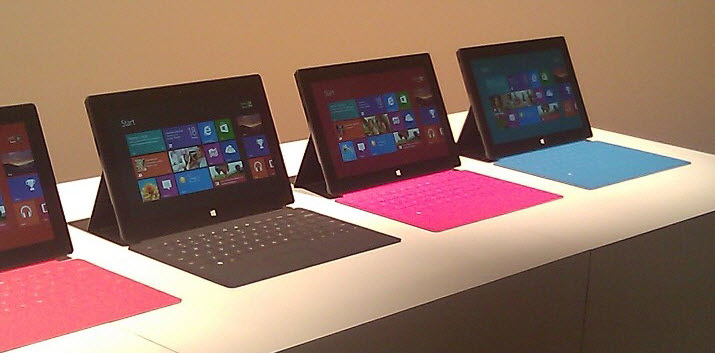Microsoft's Surface tablet: The preannouncement strategy doesn't fly today

Microsoft's Surface tablet---a Windows 8 tablet with a snazzy keyboard and nice industrial design---made its debut last week, but the biggest question is whether the software giant's 1990s era preannouncement will fly this time.

To be sure, Microsoft's Surface tablet looks impressive, but there are so many questions left over that it's almost comical. Danny Sullivan mocked the pseudo hands-on reviews. Ed Bott said the Surface made a good first impression.
Unfortunately, Microsoft withheld launch dates, detailed specs and pricing.
Why? Microsoft was trying to front-run Google's I/O developer confab this week in San Francisco and rushed it. Google is likely to roll out some sort of tablet, which will be pegged to its Play store. A Google tablet would be aimed at Apple's iPad as well as Amazon's Kindle Fire.
Should Google make a big tablet splash---for real this time---Microsoft couldn't afford to go without a Surface story.
Also: How the tech press reacted to Microsoft Surface
The difference between Microsoft's Surface unveiling and dozens of product preannouncements before it is the market has changed. Microsoft used to be able to announce a product was coming, freeze the market for competitors and then launch to its established customer base.
Today, Apple has the tablet installed base, but doesn't preannounce products. Apple does a keynote, announces an availability date and rolls it out with a splash. Microsoft's preannouncement strategy grabbed buzz, but without concrete details it's using a PC-Windows OS announcement strategy in the post-PC era. Bottom line: You'll still buy an iPad unless there are more Surface details.
Sure, Microsoft could have enticed a few enterprises looking to consolidate tablet and PC buying cycles, but the reality is businesses are just moving to Windows 7 and aren't going to budge for Windows 8. Microsoft doesn't have the mobile phone market share to freeze out the Android and iOS competition.
In other words, the Surface looked good, but will stumble if it doesn't get out the door quickly---like in a month or two quickly. Preannouncements may pause a few folks, but Microsoft can't work its market freezing magic like it used to.
ZDNet:
- Microsoft's new Surface tablets make a solid first impression
- Microsoft Surface tablets: Reading the fine print
- Surface: Microsoft, What the Hell is Wrong With You?
- Surface: Why Microsoft's big mystery turns out to be a big mistake
- What OEMs desperately need to learn from Microsoft's Surface
- The "do not touch" Microsoft Surface touch tablets
- Microsoft Surface tablets: Target is mainstream, not enterprise